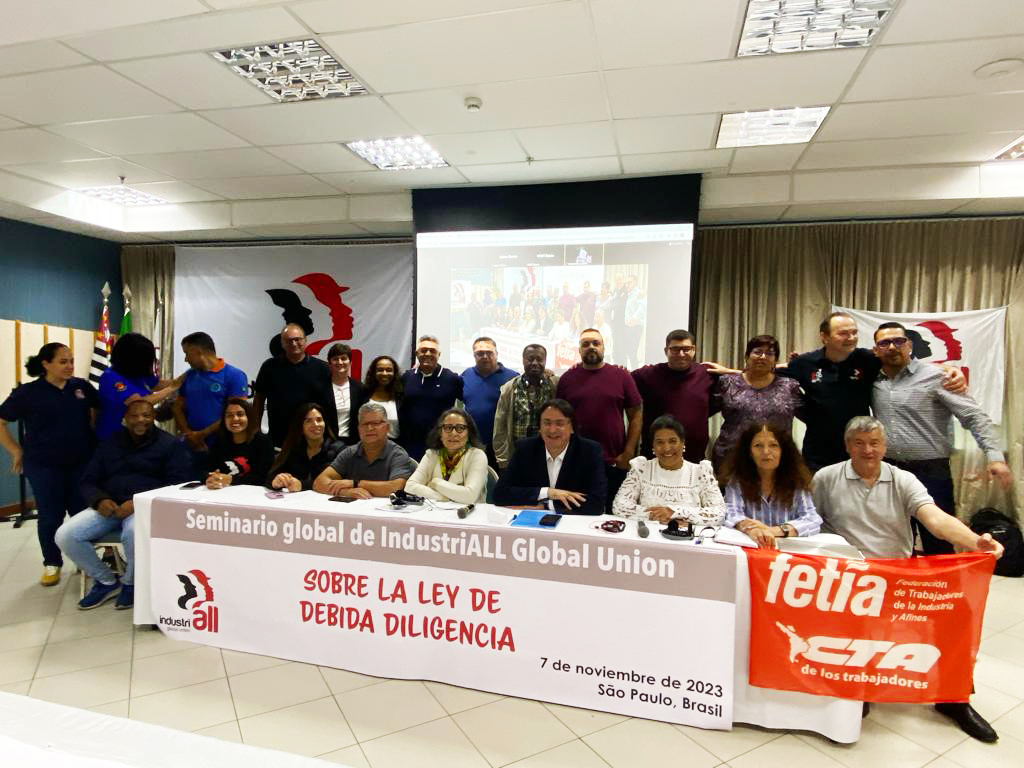Read this article in:
English
17 November, 2023IndustriALL affiliates in Latin America and the Caribbean met in São Paulo, Brazil, on 7 November to discuss how to use due diligence to defend workers’ rights throughout the supply chain.
IndustriALL assistant general secretary, Kemal Özkan, opened the meeting with a presentation on due diligence and how trade unions can use it to ensure that companies respect labour rights and assume responsibility for violations in their supply chains.
“When there is a violation in the supply chain, everyone must take responsibility. We need to create a new legal environment where all companies and governments assume their share of responsibility. We need something that is regulatory and binding, like a due diligence law, to ensure accountability,”
said Özkan.
Blake Harwell of the Trade Union Advisory Committee to the OECD went on to explain that the OECD has Due Diligence Guidance for Responsible Business Conduct. The document sets out how to ensure meaningful due diligence, starting with developing an awareness of violations with a view to preventing and remedying them. He highlighted that the guidance prioritises collective bargaining and trade unions.
He added that unions can also take complaints to the OECD’s National Contact Point (NCP), and engage with investors, shareholders and prosecutors to explain what is happening, and use the recommendations to show that a company is not following the guidelines.
IndustriALL’s director of mining and occupational health and safety, Glen Mpufane, spoke of the importance of understanding and using human rights due diligence to strengthen trade union power in Latin America. He said that there had been significant developments in the region, with several governments having already developed National Action Plans on Business and Human Rights, such as in Colombia, Chile and Peru, and others in the process of drafting them, such as in Argentina, Honduras, Ecuador, Brazil and Mexico.
Angelica Jimenez from IG Metall and Hannes Hauke Kühn from IGBCE spoke about the due diligence law that Germany passed and started to apply this year. They pointed out that it is preventive in its approach, as it foresees measures enabling companies to improve their prevention mechanisms and to rectify processes that do not work or that pose a threat to human, labour and environmental rights.
They emphasised how essential the role of trade unions is in the due diligence system, enabling them to strengthen their position as recognised social dialogue partners and responsible collective bargaining agents, with a view to negotiating preventive and corrective measures and helping to implement them in the workplace.
The Friedrich-Ebert-Stiftung (FES) representative, Waldeli Mello, spoke about the work of the FES on due diligence in Brazil. She said that FES-Brazil supported and contributed to the drafting of Bill (PL) 572/2022 on the establishment of the Framework Law on Human Rights and Business, which sets guidelines for the promotion of public policies, accountability throughout the supply chains of transnational corporations, their subsidiaries and public and private investors. It also respects and recognises trade unions as legitimate subjects in establishing dialogue and defending the interests of those whose human rights have been violated or are at risk of being violated.
IndustriALL’s regional secretary, Marino Vani, concluded:
“
If we are familiar with due diligence laws and we know there is a problem in the supply chain, we can talk to the company. When we know our rights, we have power, and we can use it to open doors to reach an agreement without confrontation.
Companies use the strategy of breaking down production processes into supply chains to make more profit. We can use trade union networks to increase union pressure, to better organise workplaces and to defend workers’ rights throughout the companies’ supply chains.”





